Monday
The sun is shining as I touch down at Palma airport – a glorious relief from the grey, damp English winter. Rob Hatch, my guide to all things Mallorquin, is waiting in the arrival hall, fortunately without a handwritten sign that says ‘Mr Napalm.’
We head into the city to visit two velodromes – one old and derelict, the other modern and shiny – to record a piece for Sunday’s episode, which is when the five-race Challenge Mallorca concludes with the Trofeo Palma.
El Tirador has been derelict for decades and is now overgrown and broken to a point that seems beyond repair. The Palma Arena, or Velòdrom Illes Balears, is only a kilometre or so away and is where British Cycling’s era of dominance on the track really began, with a mighty haul medals in the 2007 World Championships. It’s also where Rafa Nadal faced Roger Federer in the ‘Battle of Surfaces’ tennis match when they were both at the peak of their powers. One side of the net was clay, the other side grass – very much the Strade Bianche of tennis.
The Challenge Mallorca is a stage race that isn’t a stage race. It’s actually five individual events, grouped together, offering teams the chance to pick and choose which riders to field on a daily basis. A five-day stage race with a couple of rest days sounds like my ideal race…
We head to Port d’Andratx, a pretty little port, for lunch and to wait for the conclusion of the women’s Challenge Mallorca, before heading to Sóller, my base for the week.
After checking into my hotel – the homely boutique Lluna Aqua close to the main square, if you’re interested – I head up to Rob’s apartment (the Home of Cycling) for dinner.
I’ve known Rob a long time – he was first on The Cycling Podcast ten years ago – but we’ve not spent all that much time together because his natural habitat is the commentary box so we rarely cross paths. We did have a very enjoyable couple of days in Bath with Sean Kelly during the Giro d’Italia a couple of years ago. That was when we did a little rest day ride down to Bristol and recorded Only Fools and Cyclists.
He knocks up a very, very decent Asian-inspired chicken with side salad and we catch up on all sorts over a couple of Mallorcan beers.
‘You can get these in Booths at home,’ he says.
Welcome to Sports Tours International
Our coverage of the opening weeks of the 2025 season is brought to you by our new title sponsors Sports Tours International.
Whether you want to ride one of the best sportive events or watch the greatest races in the world, Sports Tours International can take you to the heart of the action.
Ride like a pro at the Étape du Tour, the inaugural edition of the Étape du Tour de France Femmes, which launches this year, La Marmotte, or the Mallorca 312. Sports Tours International will get you to the start line in style so all you have to do is pedal and enjoy the ride. You’ll stay in great accommodation close to the events, and Sports Tours International’s team of experienced, friendly support staff will look after you and your bike so you get a taste of what it must be like to be a pro rider.
If you’d rather watch than ride, Sports Tours International can get you up close to the professional peloton too. Perhaps you’ve always wanted to go to the Tour of Flanders, Paris-Roubaix or the Tour de France but haven’t known where to start. Let Sports Tours International take care of all the logistics.
You can choose from a range of packages – watching the Tour of Flanders on the Oude Kwaremont, or Paris-Roubaix from the velodrome. Enjoy the VIP treatment at the Tour de France’s final stage in Paris, visit Mont Ventoux, or even follow the race from a front row seat in an official Tour de France car. Check out their full range of cycling trips at sportstoursinternational.co.uk
Thanks to Sports Tours International for supporting The Cycling Podcast. Their title sponsorship meant we can make the KM0 series Never Mind The Balearics free for everyone to listen to.
Tuesday
We’re about to record the regular episode when the news is released that Eurosport is closing its UK and Ireland channel and the cycling rights are transferring to TNT and Discovery+ with a significant price hike.
Understandably, British cycling fans are angry and frustrated at the price rise and, as the public faces of the channel’s cycling coverage, a fair bit of that frustration is directed at Rob and his colleagues Orla Chennaoui and Adam Blythe, which is a bit unfair because it wasn’t their decision.
When I was a kid, getting into cycling, Channel 4 had nightly Tour de France highlights, there was the occasional Friday night Kellogg’s city centre criterium, later on the Kellogg’s Tour of Britain, and that was pretty much it. Then satellite television came along and showed the Classics and other stage races. We never had a satellite dish because they were ‘ugly, expensive and there’s hardly anything on the four channels we’ve got at the moment’, according to my Dad. For a pound, a friend at school, whose family did have a dish, would record some of the races for me.
Even though Eurosport was the self-styled ‘home of cycling’ I can remember the frustration of the coverage being curtailed because the tennis or snooker – it was always tennis or snooker – had over-run. I remember recording the 1999 Milan-Sanremo and got home in the evening to watch, hoping to at least see them race over the Cipressa and Poggio. All we got was the bit from the bottom of the Poggio as they swung onto the Via Roma. We saw Andrei Tchmil firing off the front in the closing kilometre and that was that.
Over the past few years, we’ve been very lucky to have such extensive coverage on Eurosport and GCN at such great prices. It’s only a few years ago that Eurosport Player was £19.99 for a whole year. GCN pushed that up to £39.99, which was still extraordinary value. But perhaps the multi-million pound losses reportedly incurred by GCN indicate that charging those prices was not sustainable in the long run.
Discovery+ will cost UK viewers £30.99 a month – a price that many will refuse to pay, while those who do pay may well feel resentful.
I am sure the audience in the UK will dip as a result but I think it’s a mistake to assume it’s purely profiteering. The fact is, if it were left to market forces a lot of the races we’ve become accustomed to seeing on TV or streaming services wouldn’t be shown at all. Many of the races actually pay the broadcasters for coverage, using sponsorship money to cover those costs. Covering cycling live is expensive, with the bills for helicopters and satellite time charged by the quarter-hour mounting up very quickly.
There’s a delicate economic ecosystem in cycling and it’s fair to say I didn’t nail explaining it in a few minutes on our podcast, nor will I get deeply into it here, but it is a subject I’d like to return to later in the spring. In the end, the customers will likely have a say – if the audience plummets and the races, and crucially the sponsors, have less exposure there may have to be a rethink on the pricing or the decision not to offer a cycling-only offering.
In The Speculation Episode at the start of the year, I upset one or two people by not being head-over-heels about the idea of the as-yet-to-be-defined One Cycling project, I’ve often questioned why cycling always seems to be peering enviously over the fence at richer, more popular sports assuming that there’s a lever to infinite riches just waiting to be pulled.
Cycling will now be alongside some of those richer, more high-profile sports – notably Premier League football, which has attained wealth and popularity despite not showing a free-to-air live game in the UK for more than three decades – and it has the price tag to go with it.
I said in that episode that the key to cycling’s popularity is not more money, it’s accessibility and affordability. The fact is, pro cycling’s economy is finely balanced. Team budgets and rider salaries have increased a lot in the past decade because increased TV exposure makes the wheels go round. TV delivers the eyeballs the sponsors want, and the broadcasters give the races hours of their airtime in order to show all those logos.
If there are fewer viewers in a key market like the UK and Ireland, will sponsors pay what it costs to cover the races?
Perhaps that is what the One Cycling project is going to solve. A huge influx of cash could be used to make cycling more affordable and accessible to all…

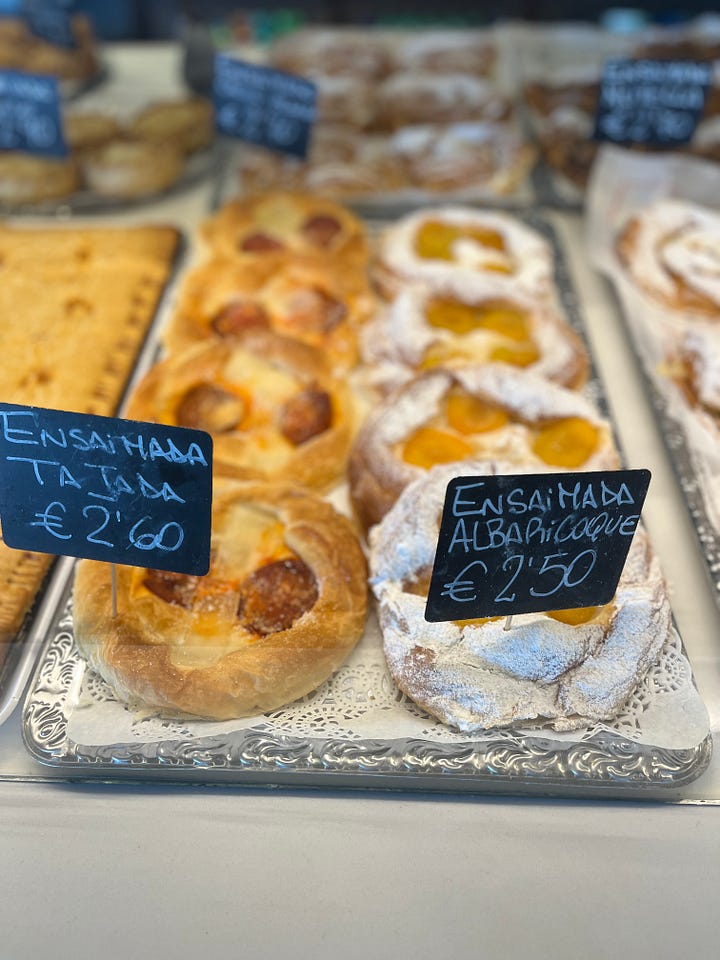
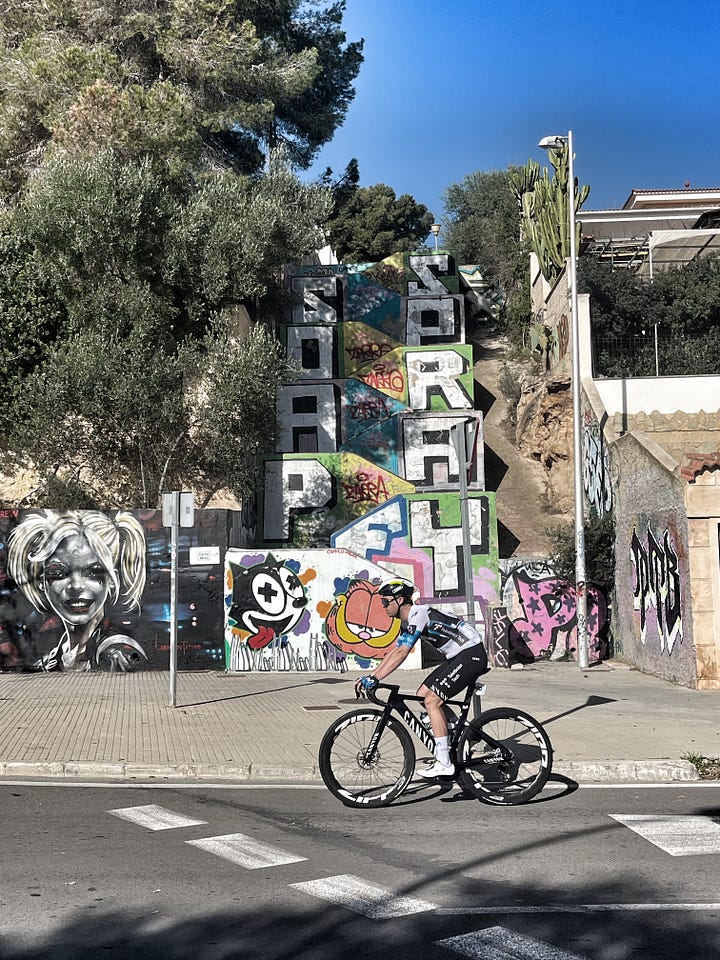

Wednesday
Back to the Balearics, then. I head to Palmanova for the first race. When I arrive, around 90 minutes before the start, there’s little evidence a bike race is about to get underway. Am I in the wrong place? It wouldn’t be the first time. We’re on a commercial estate on the edge of town. There’s a Lidl, a safari-themed crazy golf course all shuttered up for winter, and a modern cafe where I have a coffee an an ensaïmada – a soft, brioche-like bread made with lard and dusted with icing sugar. I watch nervously for the first team bus to roll across the roundabout at the top of the street. Then I see the bright pink EF Education-EasyPost bus and all is right with the world.
It’s been a while. Apart from the UCI Gravel World Championships in Leuven last October, this is the first bike race I’ve been at since the final stage of the 2023 Tour de France in Paris. Nothing much has changed – the commentator at the start line talks relentlessly over some techno music, the local dignitaries and sponsors wait for the moment to cut the ribbon and smile for the camera, and the riders gradually line up for the start.
There’s a first-day-of-term feeling in the air. Nerves, anticipation, a few conversations between friends who’ve not seen each other since last year, and then the countdown and they are away.
Later, we record over a beer outside Rob’s favourite bar in Sóller where he explains they have different prices for the locals, the Spanish and the tourists. I get charged four euros for two beers so I must be fitting right in already.
Later, we head back to Rob’s to watch the Champions League, a lavish buffet of 18 live matches, dozens of pundits, a couple of snazzy virtual reality studios, and suddenly £30.99 a month makes sense…
Rob fires up the pizza oven and makes some really excellent pizzas, caveated by all sorts of unnecessary apologies that the dough hadn’t proved for long enough. If the commentary doesn’t work out, Rob, the Home of Cycling Pizzeria has legs.
Thursday
Everything happens later in Spain, even in winter. Breakfast at my hotel doesn’t start until 8.30 so I give myself a leisurely morning before driving all the way across to the south-west of the island.
Rob suggests I visit the beach at Es Trenc. Even though it’s deserted, cold and windswept the sun is shining and, nestled between the blue sea and the nature reserve, it’s my kind of beach. No restaurants or cafes overlooking the fine sand.
I call Ciro, the world authority on beaches, for his verdict. He gives it 6/10, which I think is harsh. I later learn it’s popular in summer with German nudists, so perhaps that accounts for Ciro’s score, I don’t know.
I roll on up to the finish line in Colònia de Sant Jordi where I make a hash of recording two simple links for the episode. Between them it must’ve taken 20 takes and some of the locals gave me an odd look. In the 14 months off the mic I seem to have developed the podcasting yips.
At a bit of a loss what to do, I watch the team buses and cars pack up and begin to roll away but decide to wait for the young British rider George Radcliffe, who spent most of the day in the break and was the last man standing. He’s been to the podium to collect his prize for most aggressive rider. I end up feeling very glad I waited and not just because he declares himself to be a big fan of the podcast when we meet.
He rides for the small XSpeed United Continental team, for whom this might be their biggest race of the year. His enthusiasm, self-awareness and sheer ability to appreciate being a part of this event reminds me what races like this are all about.
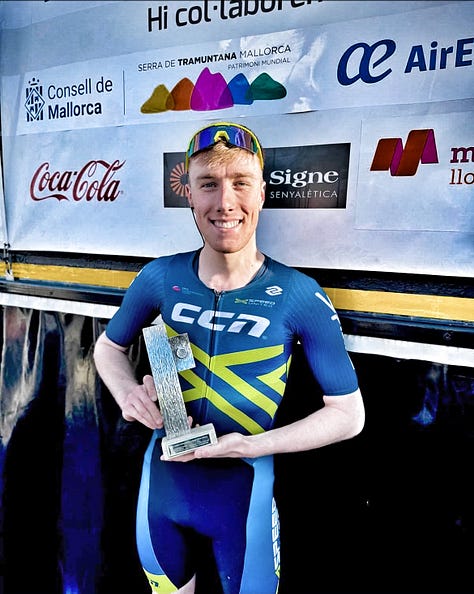

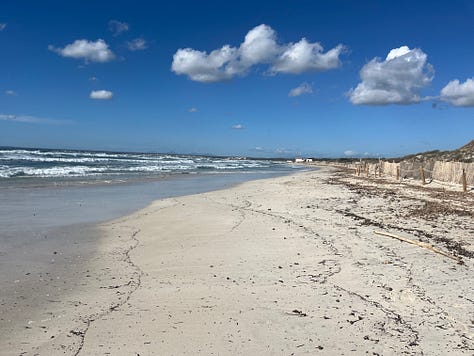
Friday
I buy myself a picnic, the star of which is a chicken curry empanada, and head out to the Col de Sóller. As I wind my way up, taking each tight hairpin I am reminded of at least one Mallorcan training camp spent grovelling over this climb, hungry, out of water, with no money. The classic amateur’s training camp experience.
It’s a beautiful climb, even in cold, damp conditions, and a small handful of other spectators have made their way out to watch the riders and give a bit of encouragement. The applause of half-a-dozen people gathered in the little roadside layby sounds like someone has just notched a half-century in a less-than-inspiring county cricket match but the racing is full on as they go past us.
Saturday
Andratx is cold and depressing, a far cry from the pretty Port d’Andratx just down the road, where we had lunch on Monday. There’s also an incredible amount of dog mess on the pavements. It’s all over the place and so I have to keep my wits about me as I walk to the team buses, which are parked across a number of residential streets and outside the supermarket.
A mechanic from one of the teams – I won’t name and shame them unnecessarily here, because he wasn’t the only one – plugs in a petrol-fuelled generator to power the camper van. It splutters and spews horrible fumes into the air for the best part of an hour. It’s right outside someone’s house too, and when the lady emerges with her two children she gives the generator an understandably dirty look.
My mind goes back to the discussion about carbon monoxide rebreathing and the suggestion in L’Équipe that detecting the method could be problematic because pollution can lead to elevated readings. I wonder how healthy it is standing in the team bus paddock for two hours a day, breathing in the fumes from 20 team buses.
I leave 15 minutes or so before the start because I want to get to Puig Mayor, the biggest climb of the week, ahead of the road closure, and I know I’ll be cutting it fine. As I walk back to the car, I slip on the wet pavement as I go to cross the road, then my other foot slips on the road and I go down. I miss any dog mess, and I’m fine, but it’s obvious the road is slippery. As I head away I hear the squeak of wet disc brakes as a few riders do a bit of a warm-up lap of the town.
I’m two-thirds of the way to Puig Mayor when Rob rings to say there have been a number of crashes on the opening circuit of Andratx and the race is halted while the riders consider whether to go on.
I’m too far away to head back but I have the sinking feeling of having lost the news.
Sure enough, the race is cancelled and I think again of that delicate economic ecosystem. Small races that rely entirely on sponsorship, goodwill from local authorities, and TV broadcasting for their survival but are sometimes also under considerable scrutiny for course design and safety aspects that leave a little to be desired.
Often compromises have to be made according to which roads the local authorities will allow to be closed for an hour or so, and these compromises lead to courses which are not ideal. But it is the riders who have to deal with the consequences of those compromises – it is they who take the risks and suffer injuries when things go wrong.
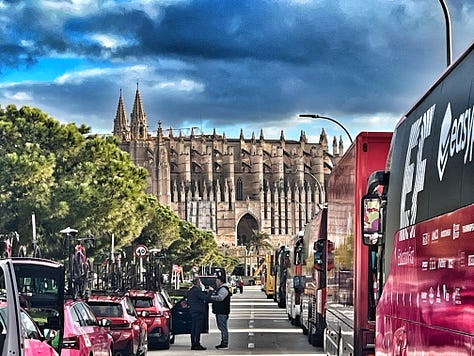


Sunday
It’s an early rise to get down to the port in Palma in good time for the 10.15 start. I speak to Michael Valgren of EF Education-Easy Post about yesterday’s cancellation. He makes some good points and even acknowledges that perhaps the riders should have waited until they were off the opening circuit and on the coast road before trying to force a break away. Lotto’s Dirk De Mol, the 1988 Paris-Roubaix winner, who has been a sports director for more than quarter of a century, says he’s rarely seen so many crashes in such a short space of time.
The race organiser is unhappy at the riders’ actions and has decided to do away with the usual pre-race podium protocol of announcing them to the spectators. I don’t witness that myself because I am busy at the team buses, but it seems a counter-productive thing to do. Small races like this are under pressure from every direction – surely working together to ensure safe but dynamic racing conditions is in everyone’s interests.
As I head away from the start, which is just across the road from Palma’s stunning cathedral, there’s some local folk music and dancing by the start line.
Rob and I have our final meal in a pizzeria in Sóller. The pizzas are good, but not a patch on the Home of Cycling’s margherita.
When I get home it emerges that one of the island’s newspapers reported over the weekend that there are advanced negotiations to take the Vuelta a España back to Mallorca for the first time since 1998 (not 1991, as I originally said in the episode). It’s rumoured the race will spend a couple of days in Mallorca in 2027, possibly even the opening stages of the race. All of a sudden, Never Mind The Balearics feels like a Vuelta preview recorded a couple of years early.
A big thank you to Rob for his company and contribution to Never Mind The Balearics.
Ask Lionel Anything
We get a lot of correspondence here at The Cycling Podcast and, such is the way of modern media, it comes from every direction and on every platform – social media posts, direct messages, emails, comments on Spotify and other podcast players, and The 11.01 Cappuccino – making it very difficult to keep up with, let alone reply to everyone.
But we really appreciate questions and comments from listeners, so I’m launching Ask Lionel Anything, an occasional series where you can ask anything you want and I’ll try to answer as many questions as I can.
Anyone can ask a question by emailing lionel@thecyclingpodcast.com and I will answer questions in batches in two places – on The Cannibal & Badger, our deliberately lo-fi forum-slash-virtual pub that is open to all Friends of the Podcast subscribers, and in a monthly post on The 11.01 Cappuccino for paid Substack subscribers.
If you have a technical question or comment that’s not intended for publication, please use the usual email address contact@thecyclingpodcast.com





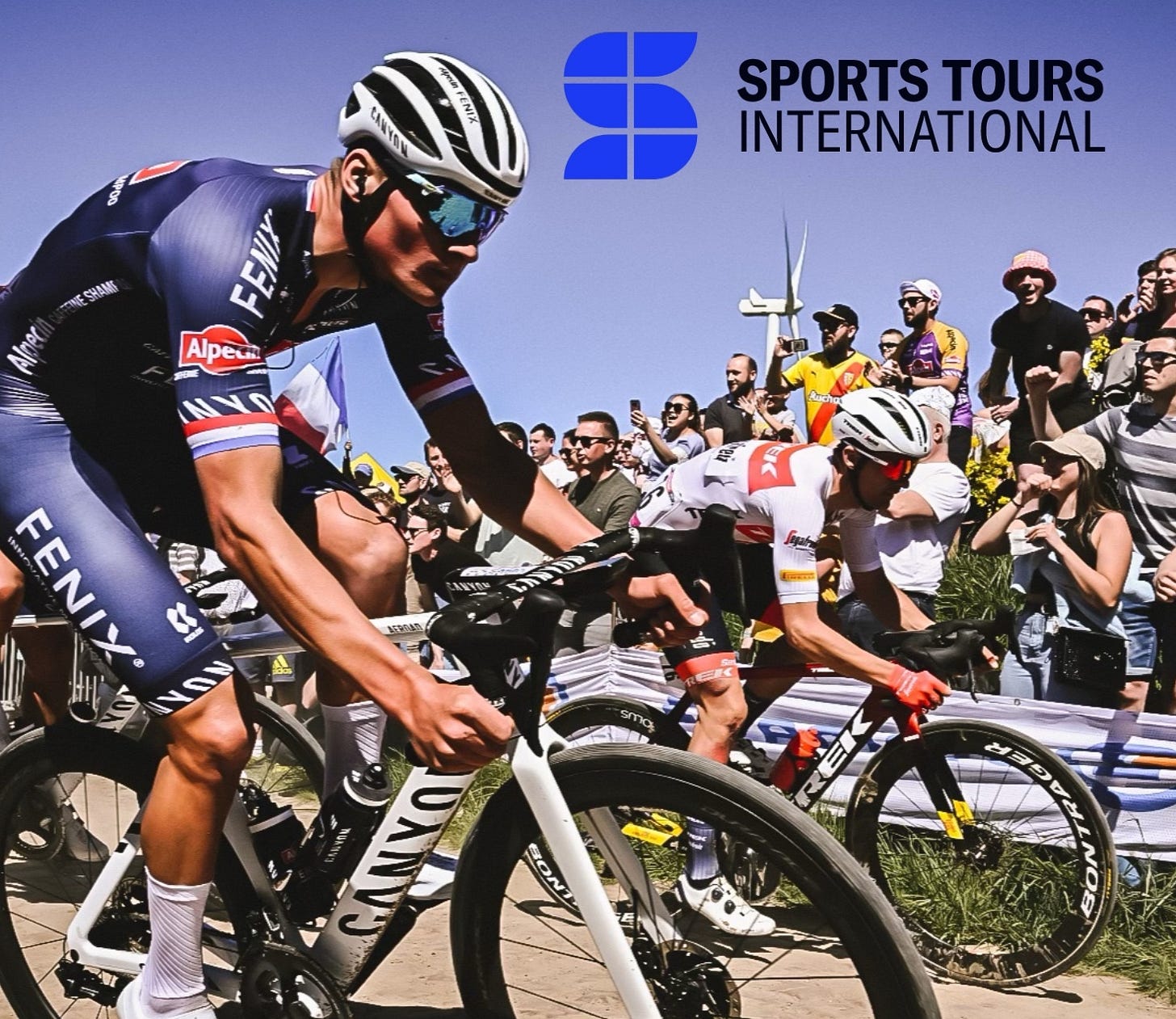
Thanks for the 11.01 Lionel. The entire series of pods were excellent. I thoroughly enjoyed them.
Really good series. Nice to have you back doing some traveling to races